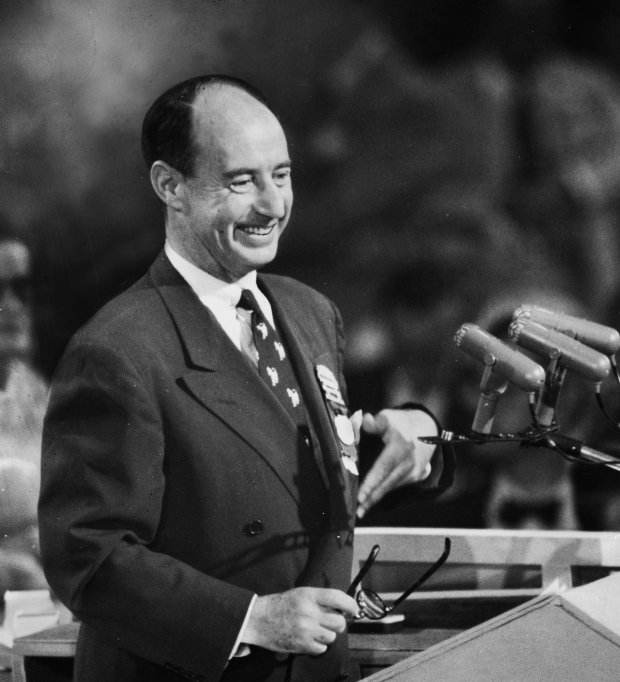In 1952, when I was 14, I got a job at the Democratic National Convention in nearby Chicago. I wasn’t much interested in politics, but a convention sounded like fun, so for one unforgettable week that July, I was a copy boy for the Chicago Sun-Times at the International Amphitheatre out by the stockyards. There, two weeks earlier, Republicans had nominated the formidable Dwight D. Eisenhower. Here is what I witnessed.
Exuberant delegates eagerly await the opening gavel, including, The New York Times reports, “525 women delegates and alternates.” Gaudy signs tout the several candidates vying for the nomination. And here comes the color guard! An orchestra blasts out “The Eyes of Texas” and “California, Here I Come,” and the aroma of ill-fated cattle next door spices the air.
Bristling with self-importance, political bigwigs exchange manly greetings and obsolete gossip from the Iowa Caucus. Senate powerhouse Lyndon Johnson is holding court over by the Texas standard. Casually mingling among the Massachusetts delegation is 35-year-old U.S. Rep. John F. Kennedy.
On each seat is a reminder that the convention is being televised; delegates are instructed to be on their best behavior. High in the vast arena, Walter Cronkite is anchoring for CBS. In 1945, there were a few thousand television sets in use across the country; now, seven years later, they’re in 17 million homes. Delegates wave at TV cameras to the folks back home.
The host governor, Adlai Stevenson II, is delivering the welcoming remarks, an antique bit of convention business. “Here, my friends, on the prairies of Illinois and of the Middle West, we can see a long way in all directions,” he says. “Here there are no barriers, no defenses, to ideas and to aspirations. … We want no shackles on the mind, or the spirit, no rigid patterns of thought, and no iron conformity.” He cheerfully mocks the GOP convention just past. “Pompous phrases marched over this landscape in search of an idea.”
In the press section by the podium, the best seats in the house, sit giants of American journalism. Walter Lippmann. James B. Reston of the Times. The great Murray Kempton. Henry Luce strides by. My job is to rush fresh copy to the bowels of the amphitheater where big-city newspapers maintain their grubby domains.
Copy paper is strewn everywhere. Men bark stories into phones, while Associated Press teletype machines clack-clack out incessant minutia from the convention. G. Mennen “Soapy” Williams, governor of Michigan, is meeting behind closed doors with Vice President Alben Barkley, who aspires to the top job. The rap on Barkley is that at 74, he’s too old to be president.
Having won 12 of 15 primaries, Tennessee’s mob-busting senator, Estes Kefauver, is the nominal front-runner. Like his fellow candidates, though — Barkley, New York’s W. Averell Harriman, Robert S. Kerr of Oklahoma (darling of big oil) — Kefauver is losing ground to a noncandidate.
Stevenson is practicing politics on unfamiliar frequencies: not bombastic or platitudinous or hokey, but rather, thoughtful, literate, witty, self-deprecating and honest.
During a secret meeting at Blair House the previous January, President Harry Truman offered Stevenson the nomination and was taken aback when the first-term governor declined.
Being governor of Illinois, he has insisted for a year, is the full measure of his ambition. But his ambivalence about reaching for higher office sets him apart, and an army of volunteers proceeds on his behalf anyway. By the convention, he is unstoppable.
When, on the third ballot, Stevenson is drafted as the Democratic nominee for president, having done nothing to advance his cause, having in fact discouraged it, he accepts. “I feel no exultation, no sense of triumph,” he says.
The last night at a national convention is tremendous theater. VIPs beam into blinding flash bulbs. Work done, their “Madly for Adlai” signs thrust high, delegates roar in anticipation.
America awaits the new fellow.
He speaks of sacrifice, morality, assaults on human dignity. He reminds his party of “silent millions who look to us for compassion, for understanding and for honest purpose.”
He calls Eisenhower “a leader, whom we all respect.”
“More important than winning the election is governing the nation. That is the test of a political party, the acid, final test. When the tumult and the shouting die, when the bands are gone and the lights are dimmed, there is the stark reality of responsibility,” he says. “Let’s talk sense to the American people. Let’s tell them the truth, that there are no gains without pains. … Better we lose the election than mislead the people.”
When he’s done, the place goes nuts. Truman raises Stevenson’s hand in victory. Above the din blares “Happy Days Are Here Again.” On such nights, everything is possible.
Ahead for Stevenson lay bruising defeats in a life of honor and high purpose. That night in Chicago, he sparked in me, in millions, a flame of idealism, and even here, in the political sewer we all now inhabit, it never quite goes out.
Calvin Fentress is a retired journalist and former aide to Republican Illinois U.S. Sen. Charles Percy.
Submit a letter, of no more than 400 words, to the editor here or email letters@chicagotribune.com.



